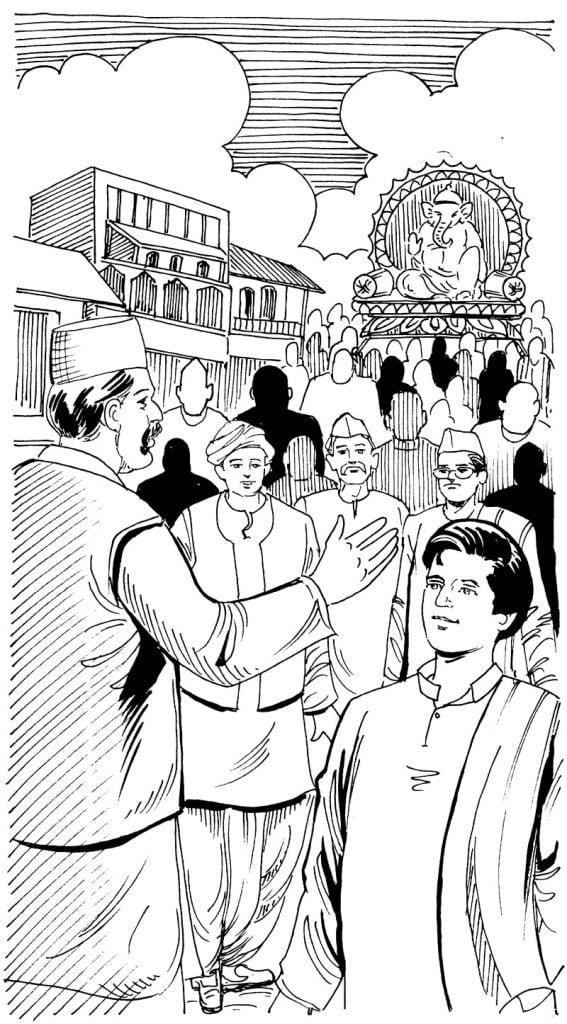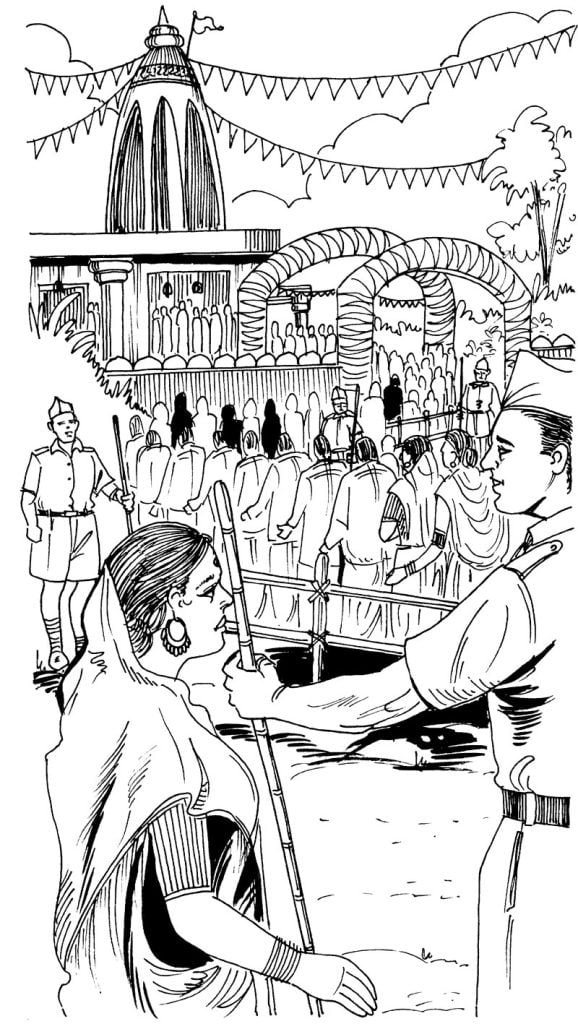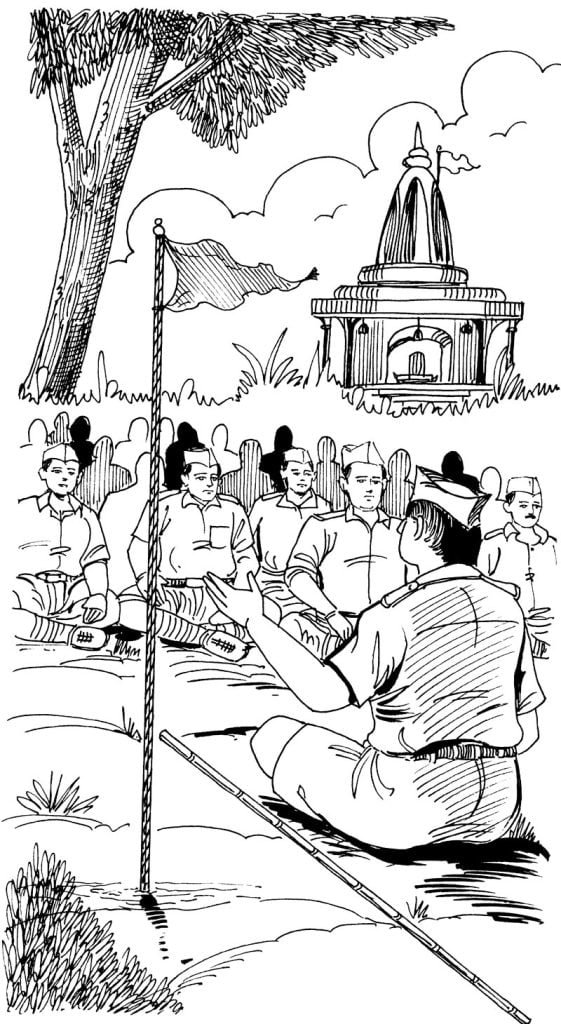On 17th April, 1926 ‘Rashtriya Swayam Sevak Sangh’ was born. Its blue print was already drawn in the mind of Dr. Keshavarao Hedgewar. He could no more wait to put his idea in action.
On that day of Dussehra, Keshavarao called a meeting of around a score of his close associates. He announced that he was starting an organisation called ‘Rashtriya Swayam Sevak Sangh’.
He invited suggestions about the aims and objectives of the Sangha.
Different suggestions were made. After a lot of discussions and debate the shape of the RSS began to crystalize before Keshavarao. The main objective of the organisation would be the resurrection of Hindu state.
There was a large backyard in house estate of Sardar Mohite in Mahal area of Nagpur. In the beginning the members of Sangh collected in that courtyard. The members used to arrive early in the morning at 5 a.m. and discussed the current affairs and the glorious past of the Hindus.
After a few days physical exercise was added to the morning programme.
Martandrao Jog took care of the physical training.
Then some officials and men of the letters began to arrive at the meetings. It was felt that the youngman needed to be educated to make them realise what was expected of them. They educated the members on current affairs, the political situation and the Hindu cultural heritage. It was meant to make the members aware of their duties.
The educated people provided intellectual guidance. Sometimes Keshavarao also used to speak. He would ask the members to speak with him. In due course this educated section evolved into the intellectual core of the organisation which acted as its brain.
Gradually the gathering of the members became regular and well set routine exercise. First the members would do physical exercises. Then they would sit down to exchange views or hold discussions or some speaker would deliver an educative or ideological lecture. The members were asked questions and encouraged to express themselves.
Keshavarao would initiate discussions on various topics and new subjects.
It helped him gauze the intellectual depth of the members.
One day a member suggested, “We gather here everyday and talk. We must have some programme besides that.”
“What kind of programme? Please reveal what have you in your mind?” Keshava asked.

“I mean some meaningful programme or training like swordry or wielding lathi.”
Keshava liked the idea because it could make the exercise purposeful in addition to giving the members self confidence. He thought over it and drew a concrete plan.
Lathi became a part of member’s equipment.
Next day when the members reached the ground for the usual meeting they found the ground had been swept clean. There was not even one speck of dirt. The swept ground had been sprinkled with water. Lines were drawn on the ground for a game of Kabaddi.
The members asked one another who had done the clean up job. No one had any idea.
Keshava quietly listened to their talk. He himself had done the cleaning without telling anyone about it. He believed in self help instead of seeking help or ordering others.
It was an example for the other members.
The message went down well. From that day on the members started cleaning the ground before exercises. They did it voluntarily.
The members took part in the games very enthusiastically. Watching them play attracted the attention of other youngmen and they came to become members of the Sangh. Gradually a spirit of discipline was setting into the members of Sangh. They had become punctual and absenteeism was almost negligible. The membership of the Sangh had risen to 100.
By now traders and school children had also started joining the Sangh exercises. The college students were reluctant to join it. Keshava talked to them and tried to allay their fears.
It worked and college students also began to attend the Sangh meetings. Very soon the meetings became over crowded.
On the occasion of Ramnavami Keshavarao decided to take the Sangh members to Ramtek temple. He wanted to demonstrate the usefulness of his cadres.
On Ramnavami day huge crowds used to converge on the temple. Most of the devotees hardly could get chance to see the Rama idol of the temple due to crowding and the absence of any order.
It was the right occasion to introduce Sangh to the public.
Earlier the students of an orphanage used to go to the temple with saffron flags. Keshava decided to take his workers in a different fashion.
He reached Ramtek temple one day before the festival day with his Sangh volunteers. All of them took bath in the morning and got ready by 8 a.m.
All trooped to the temple and stationed themselves at the main gate.

There were very few policeman to control the crowds. That is why every year the situation got out of control and stampedes got started causing deaths and injuries.
R.S.S. volunteers took management of the crowds in their hands as Keshava had trained them for. The volunteers made the devotees stand in queues and enter the temple in orderly manner.
It worked fine.
There was no stampeding.
Then some of the volunteers arranged for water for the thirsty devotees. Some touts used to fleece people by promising them special entry into the temple.
Keshava dealt with such elements with firm hand and got them driven away. He was strictly against any manipulation or exploitation. Inspite of being a hardcore Hindu he hated religious frauds and stunts.
The volunteers rendered great help to the people. They remained busy from 8 a.m. to 5 p.m. It earned the Sangh great popularity and the public admiration.
At 8 p.m. all the volunteers took meals and took stock of their work plus people’s positive response. It was decided that they would render similar service to the people every year.
And they did.
It created a positive image of R.S.S. among the people. More young people joined the organisation and its spread was fast.
The youth trained in Lathi wielding and sword handling also joined Sangh formally to become its bonafide members.
Increasing numbers led to formation of various units whom Keshava systematically introduced to the ideology of the organisation.
The popularity of R.S.S. brought horde of young people. Keshavarao was not in favour of filling RSS ranks blindly without setting up some qualification criteria.
The first rule he made was for a new member to have his application of membership attested by atleast two existing RSS members. He was a very good judge of human character. In one glance he could fathom a person’s general aptitude.
Keshava used to get introduction from all young newcomers. He asked questions. Anyone failing to provide prompt answers was asked to reappear after five days. Many of the aspirants got rejected in the very first instance.
There was magnetic attraction in Keshava’s personality. And he was a sweet talker who could win any heart very easily. His sincere and emotional pitch made a deep impression on the listener.
His patriotism was always there reflected in his every move or act.
Before enforcing any rule on the organisation he used to apply it on himself and acted upon it. His belief was that any principle applied on others must first be tried on ownself. It proved the desirability of the principle to others which made it readily accepted.
Once he went to a friend’s house to attend some function. That house was 32 miles (40 kms) away from Nagpur. He made it to that place in time but return journey was problematic.
The last bus to Nagpur, he had already missed. The next day was Sunday and his presence at the R.S.S. meet in the morning was imperative. He would not skip it.
So, he set out on foot accompanied by four other workers. One of them queried, “Nagpur is 32 miles away. When shall we reach there?”
“Don’t worry. We will walk all night and I am sure that we shall be there right in time for the morning programme,” Keshavarao firmly said.
It is rightly said that God helps those who help themselves. They had barely walked a few miles when a car going in Nagpur direction stopped by their side. The driver of the vehicle knew Keshavarao.
“Where to Doctor Saheb in such a nightly hour?” the motorist asked.
“Going to Nagpur. We missed the bus. So, we had to beat the road. Our presence in the morning at our headquarter is a must,” Keshavarao informed.
“Come on in. I am also going to Nagpur. I will drop you at the headquarter,” the motorist offered.
All of them got in and were driven to Nagpur. They were home by 1.30 a.m.
Thus, they got some time to rest before the busy day began.
Next day, Keshavarao and his fellow workers attended the meeting right on the schedule.
Keshavarao’s day was always busy. He got little time to rest through the hectic schedule. One of the main matter of interest for him was to keep abreast of social and political developments.
Once he had to go to a village to attend a RSS business. On that day, in Keshavarao’s absence a large public meeting was organised at Nagpur.
It was not related to RSS. And no RSS worker had worked for it or attended it.

The people had gathered in large numbers to make it a massive meeting.
Several well known leaders spoke. The people were listening to the speeches in rapt attention. Then, some goons arrived to disrupt the meeting. A goon threw a frog into the crowd. Another yelled, “Snake! Snake!!” That started pandemonium. The people ran helter and skelter blindly.
In the melee some people got trampled upon and seriously injured.
When Keshava returned to Nagpur he learnt about the incident. It pained him. He sought out details from the people who had witnessed the scene or were participants to the meeting themselves.
“How did all the commotion start?” He enquired.
‘‘Because of the mischief of some goons,’’ a man informed and revealed, ‘‘I was there and saw what they did. They threw a couple of frogs into the crowd and started the panic. I tried to nab the goons but I could do little being alone.”
Keshava nodded his head sadly.
After a thought he revealed to the fellow members of RSS, “That is the real trouble with we Hindus. Every one says ‘what could I do being alone?’ Nothing can be achieved until we cleanse our mind of this sick mindset. We are hundreds of millions strong yet everyone feels lonely. The enemy is in the minority. But they come in gangs and scare away millions. The only difference is that the enemy knows how to gang up. We must change this mindset. No one is alone or lonely. Every Hindu must think that God is with him. We must put this message across into Hindu society. Then, we can win freedom and make something out of us and our country.”
